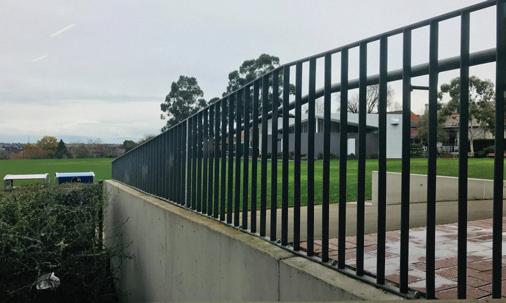
6 minute read
Evaluate the effective use of power by two or more states in the pursuit of their national interest
Hamish Galbraith, Year 12
Evaluate the ef fective use of power by two or more states in the pursuit of their national interest
A border of 1,420km separates the two powers of China and North Korea, but, in reality, these states are worlds apart, largely due to the effectiveness of their use of power. China has been far more effective in their use of economic power to achieve their national interest priorities. In recent years though, North Korea has been increasingly effective in their use of diplomatic power compared to the US, as shown through their improved relationship with that nation. Despite the growing power of North Korea, China is still dominant as they can utilise their power more effectively, especially their military power, to influence the actions of other global actors to achieve their national interest priorities.
China’s superior production capability relative to North Korea grants them significantly more economic power to influence the actions of another state through finance and trade. China currently engages in trade and investment agreements with over 100 states globally and maintains bilateral free trade agreements with 14 states, whilst North Korea has no free trade agreements and trades almost exclusively with China. China currently exports $2.41trillion USD of goods and services and has a trade surplus of $870billion USD. Comparatively, North Korea exports a mere $1.74billion USD and maintains a trade deficit of $1.98billion USD. China’s massive trade volume and the dependence of many states, including North Korea, on trade with China, grants them huge amounts of economic power which they can use to influence the actions of states. They can use this power to achieve their national interest priorities. China effectively utilised their economic power through the enforcement of United Nations sanctions against North Korea, achieving their national interest priorities of improved international standing and national security. In 2017, China restricted all imports of coal from North Korea, as well as ordering all North Korean businesses operating in China to cease operations within 120 days, crippling the North Korean economy. Despite China’s economic prosperity being impacted by decreased exports, they increased their national security and ensured their continued sovereignty as North Korea ceased their missile tests. North Korea’s lack of trade agreements gives them limited economic power and hence limits their ability to achieve their national interest priorities. North Korea’s lack of trading partners and ability to influence their actions meant that they were unable to persuade trading partners, mainly China, to continue to trade with them despite the sanctions. This decreased their economic prosperity and regional relationships, showing that North Korea was ineffective in their use of economic power in their pursuit of their national interests.
In recent years, however, North Korea has become increasingly effective, when compared to China, in their use of diplomatic power in their relationship with the United States. Since the beginning of the Trump presidency in 2017, the China-USA relationship has continued to
Finn Robinson - Year 12
sour, resulting in a trade war between the two states. The trade war was initiated by the US in response to what was described by US Trade Representative, Robert Lighthizer, as ‘unfair trade practices by China… including but not limited to the theft of US intellectual property’. The US imposed $50-60billion USD of tariffs on Chinese goods. China responded by imposing tariffs on 128 American goods and services. The failure to reach a diplomatic foreign policy agreement with the US shows a decline in their regional relationship. Lawrence J Lau, a Chinese economist, believes that the tariffs ‘will wipe one-half of a percentage point from Chinese GDP by 2022’, a loss of more than $19billion USD. This highlights the failure of Chinese diplomatic power as they have failed to achieve a positive regional relationship and economic prosperity and hence have used their power ineffectively to achieve their national interests. In contrast, under Trump, North Korea and the US have strengthened their diplomatic and regional relationship through summits held in 2018 and 2019 in Singapore and Hanoi respectively. These summits highlight the increased diplomatic power that North Korea now has and its effectiveness in achieving national interest priorities with regional relationships. In terms of their use of diplomatic power and their relationship to the United States, it is clear that in recent years, North Korea has become more effective in achieving their national interest priorities.
Whilst North Korea continues to expand its power, it lacks the military power of China and hence is still unable to achieve its national interest priorities as effectively. China has the biggest military in the world with 2,035,000 active personnel and a further 510,000 in reserve. Comparatively, North Korea has the fifth largest military force with 950,000 active personnel, and 7,620,000 reserve troops, mostly in the form of paramilitary troops. North Korea’s ‘Songun’ or ‘military first’ policies have played a key role in the recent increase in the size of the North Korean army, the world’s largest per capita. Despite the large size of the North Korean army, the Chinese military remains far more effective in their capabilities. This was highlighted by China’s actions in 2013 in the South China Sea as they established military bases on islands such as the Fiery Cross Reef within the Philippines’ territorial waters as defined by UNCLOS, demonstrating the legitimate authority that the Chinese military is able to exercise. The ability to claim the Spratly Islands gives China a legitimate claim to more than two million square kilometres of ocean, holding an estimated 11 billion barrels of oil and 190 trillion cubic feet of natural gas. The effectiveness of the Chinese military and their military power helped China to achieve their national interests of both national security and economic prosperity through the resources that the South China Sea possesses. Whilst the coercive threat of the North Korean military continues to grow as the size of their military increases and they grow as a nuclear threat, they still lack the effectiveness of the Chinese army. During their nuclear tests throughout 2017, the North Korean army was ineffective against the coercive force of the People’s Liberation Army and the 300,000 Chinese troops moved to the North Korean border, which proved sufficient to convince North Korea to cease their provocative nuclear tests. The inability of the North Korean army to deter this force on their border shows that military power is not yet successful or effective at helping North Korea achieve their national interests. This highlights that whilst the influence of the North Korean military and their power is growing, shown through the influencing of Chinese actions, China’s military power remains dominant in achieving national interests.
Despite the rising power of North Korea, China remains more effective at using their power to achieve their national interest priorities, especially when it comes to their effective use of military power. Whilst North Korea may continue to increase their military and strengthen diplomatic ties with other global actors, China continues to use their power more effectively and hence is able to better achieve their national interest priorities.

Dominic Mann - Year 12










